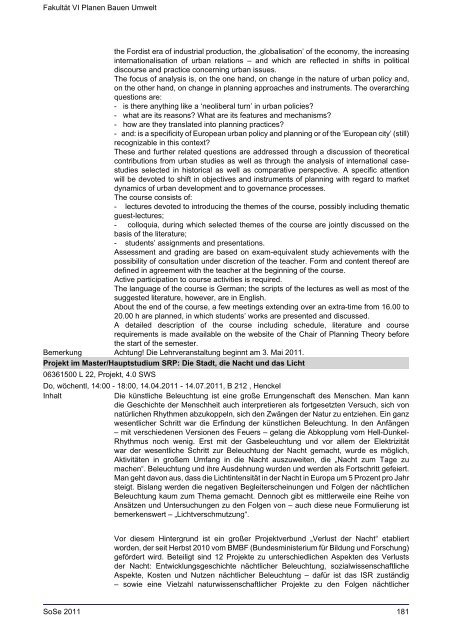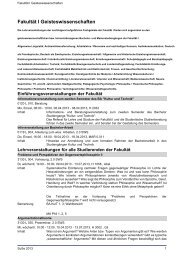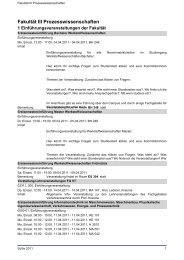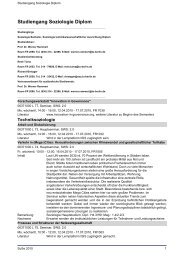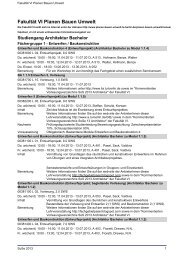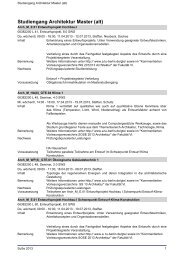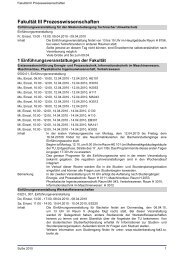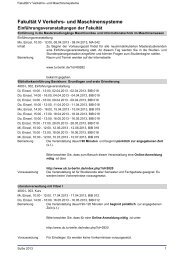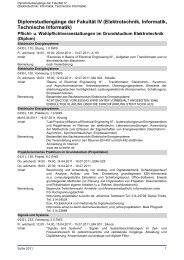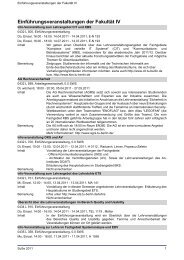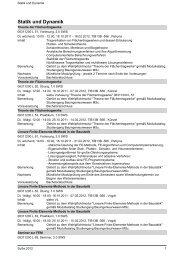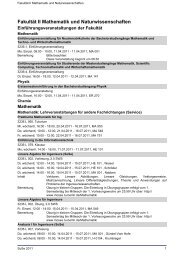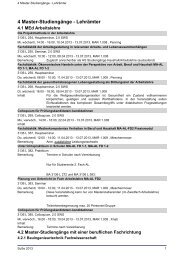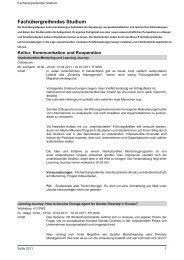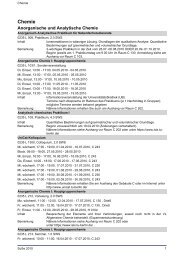Fakultät VI Planen Bauen Umwelt - TU Berlin
Fakultät VI Planen Bauen Umwelt - TU Berlin
Fakultät VI Planen Bauen Umwelt - TU Berlin
Sie wollen auch ein ePaper? Erhöhen Sie die Reichweite Ihrer Titel.
YUMPU macht aus Druck-PDFs automatisch weboptimierte ePaper, die Google liebt.
<strong>Fakultät</strong> <strong>VI</strong> <strong>Planen</strong> <strong>Bauen</strong> <strong>Umwelt</strong><br />
the Fordist era of industrial production, the ‚globalisation’ of the economy, the increasing<br />
internationalisation of urban relations – and which are reflected in shifts in political<br />
discourse and practice concerning urban issues.<br />
The focus of analysis is, on the one hand, on change in the nature of urban policy and,<br />
on the other hand, on change in planning approaches and instruments. The overarching<br />
questions are:<br />
- is there anything like a ‘neoliberal turn’ in urban policies?<br />
- what are its reasons? What are its features and mechanisms?<br />
- how are they translated into planning practices?<br />
- and: is a specificity of European urban policy and planning or of the ‘European city’ (still)<br />
recognizable in this context?<br />
These and further related questions are addressed through a discussion of theoretical<br />
contributions from urban studies as well as through the analysis of international casestudies<br />
selected in historical as well as comparative perspective. A specific attention<br />
will be devoted to shift in objectives and instruments of planning with regard to market<br />
dynamics of urban development and to governance processes.<br />
The course consists of:<br />
- lectures devoted to introducing the themes of the course, possibly including thematic<br />
guest-lectures;<br />
- colloquia, during which selected themes of the course are jointly discussed on the<br />
basis of the literature;<br />
- students’ assignments and presentations.<br />
Assessment and grading are based on exam-equivalent study achievements with the<br />
possibility of consultation under discretion of the teacher. Form and content thereof are<br />
defined in agreement with the teacher at the beginning of the course.<br />
Active participation to course activities is required.<br />
The language of the course is German; the scripts of the lectures as well as most of the<br />
suggested literature, however, are in English.<br />
About the end of the course, a few meetings extending over an extra-time from 16.00 to<br />
20.00 h are planned, in which students’ works are presented and discussed.<br />
A detailed description of the course including schedule, literature and course<br />
requirements is made available on the website of the Chair of Planning Theory before<br />
the start of the semester.<br />
Bemerkung Achtung! Die Lehrveranstaltung beginnt am 3. Mai 2011.<br />
Projekt im Master/Hauptstudium SRP: Die Stadt, die Nacht und das Licht<br />
06361500 L 22, Projekt, 4.0 SWS<br />
Do, wöchentl, 14:00 - 18:00, 14.04.2011 - 14.07.2011, B 212 , Henckel<br />
Inhalt Die künstliche Beleuchtung ist eine große Errungenschaft des Menschen. Man kann<br />
die Geschichte der Menschheit auch interpretieren als fortgesetzten Versuch, sich von<br />
natürlichen Rhythmen abzukoppeln, sich den Zwängen der Natur zu entziehen. Ein ganz<br />
wesentlicher Schritt war die Erfindung der künstlichen Beleuchtung. In den Anfängen<br />
– mit verschiedenen Versionen des Feuers – gelang die Abkopplung vom Hell-Dunkel-<br />
Rhythmus noch wenig. Erst mit der Gasbeleuchtung und vor allem der Elektrizität<br />
war der wesentliche Schritt zur Beleuchtung der Nacht gemacht, wurde es möglich,<br />
Aktivitäten in großem Umfang in die Nacht auszuweiten, die „Nacht zum Tage zu<br />
machen“. Beleuchtung und ihre Ausdehnung wurden und werden als Fortschritt gefeiert.<br />
Man geht davon aus, dass die Lichtintensität in der Nacht in Europa um 5 Prozent pro Jahr<br />
steigt. Bislang werden die negativen Begleiterscheinungen und Folgen der nächtlichen<br />
Beleuchtung kaum zum Thema gemacht. Dennoch gibt es mittlerweile eine Reihe von<br />
Ansätzen und Untersuchungen zu den Folgen von – auch diese neue Formulierung ist<br />
bemerkenswert – „Lichtverschmutzung“.<br />
Vor diesem Hintergrund ist ein großer Projektverbund „Verlust der Nacht“ etabliert<br />
worden, der seit Herbst 2010 vom BMBF (Bundesministerium für Bildung und Forschung)<br />
gefördert wird. Beteiligt sind 12 Projekte zu unterschiedlichen Aspekten des Verlusts<br />
der Nacht: Entwicklungsgeschichte nächtlicher Beleuchtung, sozialwissenschaftliche<br />
Aspekte, Kosten und Nutzen nächtlicher Beleuchtung – dafür ist das ISR zuständig<br />
– sowie eine Vielzahl naturwissenschaftlicher Projekte zu den Folgen nächtlicher<br />
SoSe 2011 181


